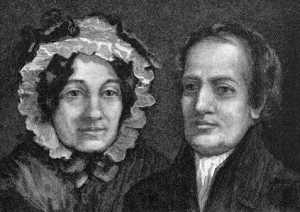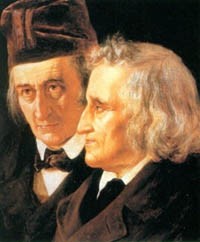Charles and Mary Lamb
 Tales from Shakespeare
Tales from Shakespeare
The book reduced the archaic English and complicated storyline of Shakespeare to a simple level that children and adults could read and comprehend. However, as noted in the author’s Preface, “his words are used whenever it seemed possible to bring them in; and in whatever has been added to give them the regular form of a connected story, diligent care has been taken to select such words as might least interrupt the effect of the beautiful English tongue in which he wrote: therefore, words introduced into our language since his time have been as far as possible avoided.”
Mary Lamb was responsible for the comedies, while Charles wrote the tragedies; they wrote the preface between them. Next to his essays, this book is his best-known work; yet its success is attributable more to Mary, whose name did not appear on the title page of the first few editions, than to Charles.
Jacob and Wilhelm Grimm

The Brothers Grimm: The Complete Fairy Tales
For almost two centuries, the stories of magic and myth gathered by the Brothers Grimm have been part of the way children — and adults — learn about the vagaries of the real world.
The work of the Brothers Grimm influenced other collectors, both inspiring them to collect tales and leading them to similarly believe, in a spirit of romantic nationalism, that the fairy tales of a country were particularly representative of it, to the neglect of cross-cultural influence. Among those influenced were the Russian Alexander Afanasyev, the Norwegians Peter Christen Asbjørnsen and Jørgen Moe, the English Joseph Jacobs, and Jeremiah Curtin, an American who collected Irish tales.
 Blog EBE English Book Education
Blog EBE English Book Education





